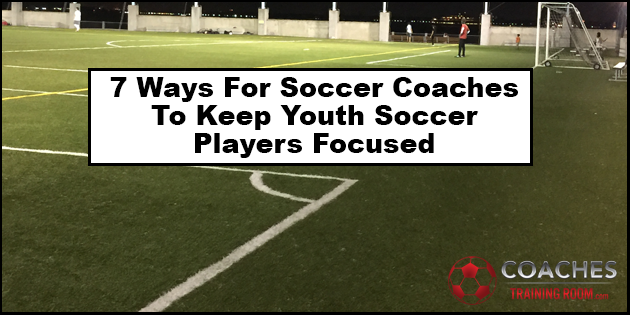When you are coaching a young or inexperienced soccer team, it’s important to talk to the players about their feelings when they step onto the field for a game. You want them to understand that there is a certain amount of emotional pressure that they will feel when they are playing and competing against another team. And when the feelings become more negative, they will begin to experience more pressure. You want your players to know that these feelings which they are experiencing are triggered from their thoughts and beliefs about themselves as athletes. Therefore, you want to teach and train these players how to use different tools in order to be mentally strong, and feel more composed and confident, and learn how to release some of that pressure when they first step onto the field. Ultimately, you are showing them how to keep steady.
-
Repeat the mantra – “I am a soccer player”. Too often, players use different adjectives to describe themselves and/or will label themselves as good or bad players based upon what they are doing in a game. Yet, by doing this, it can begin to feel like an emotional roller coaster if they are having positive and negative experiences during the same game. Tell your players that if they want to keep themselves emotionally steady then they should mentally focus only on the fact that they are soccer players.
-
Take a deep breath and count to three. There will be those game-time situations when a player will be feeling anxiety or stress, and could begin to make bad decisions on the field. You want to talk to your players about the importance of finding a moment to take a deep breath so that they can regain their composure and refocus. They need to be reminded that oxygen and getting air in the lungs is important to their brain power.
-
Stay in the present moment. It is very easy for players to get distracted and start thinking about something that happened in the game about five minutes ago or begin to worry about what may happen in the last ten minutes of that game. You want to talk to your players about the need to keep their focus on the present moment and what is happening right in front of them. If they don’t do this, the players will be very distracted and have a difficult time keeping themselves mentally and emotional steady.
-
Know what you want to do. There will be players who find themselves thinking and worrying about what they don’t want to happen or take place in a game. They then start imagining or visualizing, during the actual game, different mistakes or embarrassing moments that might actually happen. Yet, by doing this, these players are triggering stress and anxiety, and will often find themselves in those game-time situations that they didn’t want in the first place. You want to talk to your players about making sure that they are clear about what they want to do on the field and only focus on what they want.
-
Be in control. There will be many players who spend too much time thinking and worrying about things that they don’t control – the refs, players from the other team, the weather and people in the stands watching the game. These players have lost control of themselves. You can talk to your players about the importance of being in control of themselves and this will only happen if they stay focus on themselves – especially their attitudes and behaviors.
-
Use the anchor. There will be times when a player may feel like he is struggling to keep his head above the turbulent waters of a very competitive game. When this happens, the player can begin to feel like quitting or giving up. Talk to your players about finding a word, phrase, image or piece of music that they can use or visualize in their heads to steady themselves when they begin to feel overwhelmed or experience any sense of fear in that difficult or challenging game-time situation.
-
Remember the 3 game time vows. Ask your players to make 3 vows before they step on the field, and encourage them to remember those vows during the game. Tell them to make a vow to be present (now), be positive (wow) and be proactive (pow). So, at any moment of a game, including when a player is dribbling the ball down the field, the players can simply say “now-wow-pow”.
I hope you enjoyed the “7 Ways For Soccer Coaches To Keep Youth Soccer Players Focused”
Did you start your FREE 14 Day Trial Of Soccer Coaches University yet?
Article By:
Anthony Lanzillo

